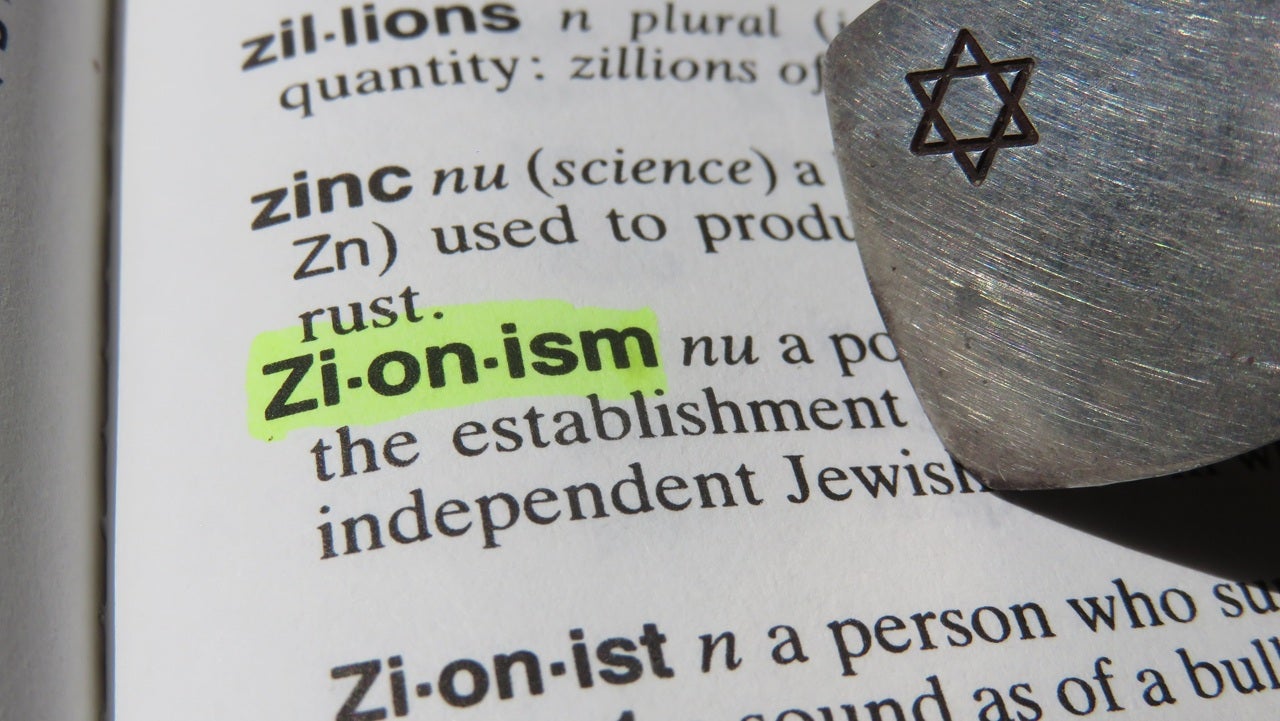
An illustrative image of a dictionary definition of Zionism. (tzahiV/ iStock/Getty Images Plus)



1. The Institute for the Critical Study of Zionism is a non-profit organization seeking to dismantle Zionism.
The Institute for the Critical Study of Zionism (ICSZ) is a far-left, explicitly anti-Zionist non-profit organization founded in 2023 by prominent anti-Zionist activists and academics who seek the villainization and wholesale rejection of Zionism—the movement for the self-determination and statehood of the Jewish people in their ancestral homeland, Israel—from academia. Utilizing a scholastic veneer, this activist group works to establish anti-Zionist activism as an academic discipline and as the only acceptable moral and scholarly stance in academia.
The ICSZ’s stated mission is “to support the delinking of the study of Zionism from Jewish Studies” and to place Zionism in the same realm academically as “decolonial studies, critical terrorism studies, settler colonial studies.” It works toward this mission by promoting a subject it calls “Critical Zionism Studies,” which frames Zionism as a co-conspirator or relative of ideologies such as Nazism, fascism, racism, sexism, homophobia, capitalism, transphobia and Hindutva (a form of Indian ethno-nationalism), among others.
In the ICSZ’s view, the current association between the study of Zionism and Jewish Studies effectively shields the movement for Jewish self-determination from the political and ideological critiques they seek to normalize. As its handout on Critical Zionism Studies states, “we have to delink [Zionism] from areas of study that fence it off from political and ideological critique” and “make clear” that the study of Zionism “is deeply and essentially connected to the study of global forces including contests over power, race, colonialism, capital, militarism, and violence.”
The delinking of Zionism from Jewish and Israel Studies serves two goals: to advance the cause of anti-Zionism and to discredit accusations of antisemitism.
The ICSZ believes “accusations of antisemitism are weaponized to advance Zionist politics” and sees the need to “reclaim” the definition of antisemitism “away from the way that Zionists misuse it,” ICSZ board member Sara Kershnar said on the April 15, 2024, episode of the ICSZ podcast Unpacking Zionism.
The desired end goal of this “reclamation” and of delinking Zionism Studies from Jewish Studies is to ultimately defeat charges of antisemitism against the anti-Zionist movement and instead label Zionism itself as “inherently antisemitic,” as Yulia Gilich, a member of the ICSZ's founding collective, put it in the opening statement on the podcast episode. The speakers in this episode allege that Zionism, and not anti-Zionism, “embraces many antisemitic concepts and... advances them” by supposedly isolating Jews and denigrating the Jewish diaspora.
The institute is not formally affiliated with any particular university and has individual members associated with different activist organizations and universities. It is also a registered 501(c)3 organization that solicits donations via its website and receives funding from the Sparkplug Foundation, of which ICSZ Director Emmaia Gelman is a trustee.
The ICSZ’s Points of Unity and various statements by the organization and its members make it clear that, beyond academia, it has organized to oppose and dismantle Zionism and the State of Israel.
“We’re opposed to Zionism and call for its elimination,” ICSZ board member Robin Kelley, a UCLA professor, stated on the November 11, 2023, episode of Unpacking Zionism.
In a May 13, 2024, episode, ICSZ board member Ronit Lentin said Zionism was "not a national liberation movement" and that there should be "thinking about dismantling this state and constructing, instead of it, a different political entity."
In response to the January 2025 temporary ceasefire between Israel and Hamas, the ICSZ posted on Instagram: “What will not end with this ceasefire is Zionism, which underwrites this genocide… We affirm that the only permanent end to Palestinian dispossession & genocide is the dismantling of Zionism and its settler state.”
These positions lend themselves more to activist strategy and expediency rather than any academic or scientific priority.
2. ICSZ leaders and members repeatedly engage in inflammatory rhetoric.
The ICSZ and its leaders have frequently made deeply inflammatory and harmful statements, and some leaders have troubling histories of publicly supporting terrorism and violence, including Hamas’s October 7 attack.
For example, Sean Malloy, a founding ICSZ member and an associate professor of history and critical race and ethnic studies (CRES) at University of California, Merced, reposted at least four tweets on X glorifying, justifying or downplaying the Hamas attack within days of October 7, including one seemingly mocking the victims of the massacre at the Nova music festival.
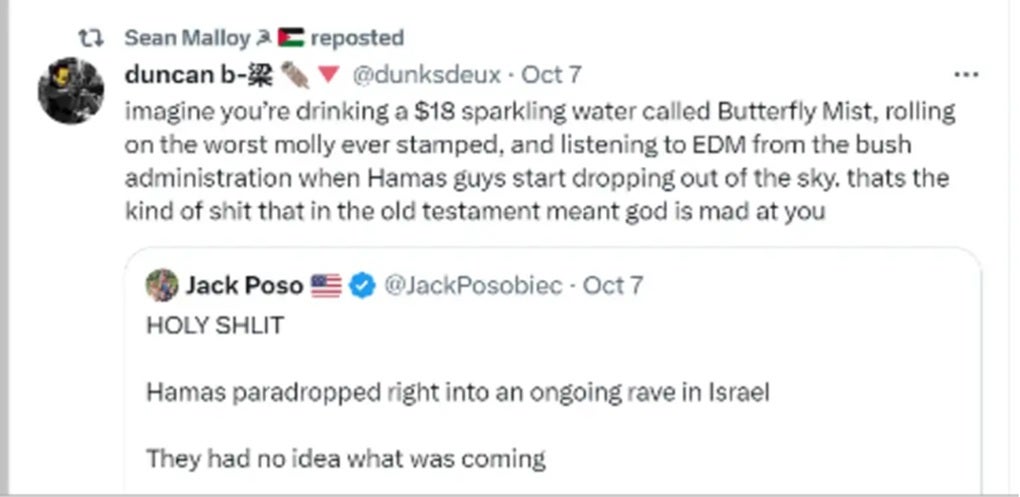

In April 2021, Malloy was scheduled to appear on a Zoom panel at San Francisco State University with Leila Khaled, a leader of the U.S.-designated terrorist organization the Popular Front for the Liberation of Palestine (PFLP). The panel was shut down for violating Zoom’s terms of service.
ICSZ founding member Prof. Rabab Abdulhadi has also made statements defending the October 7 violence, such as a tweet on the day of the attack saying, “No innocent bystanders here.” In another tweet on October 7, she also repudiated a condemnation of the violence.
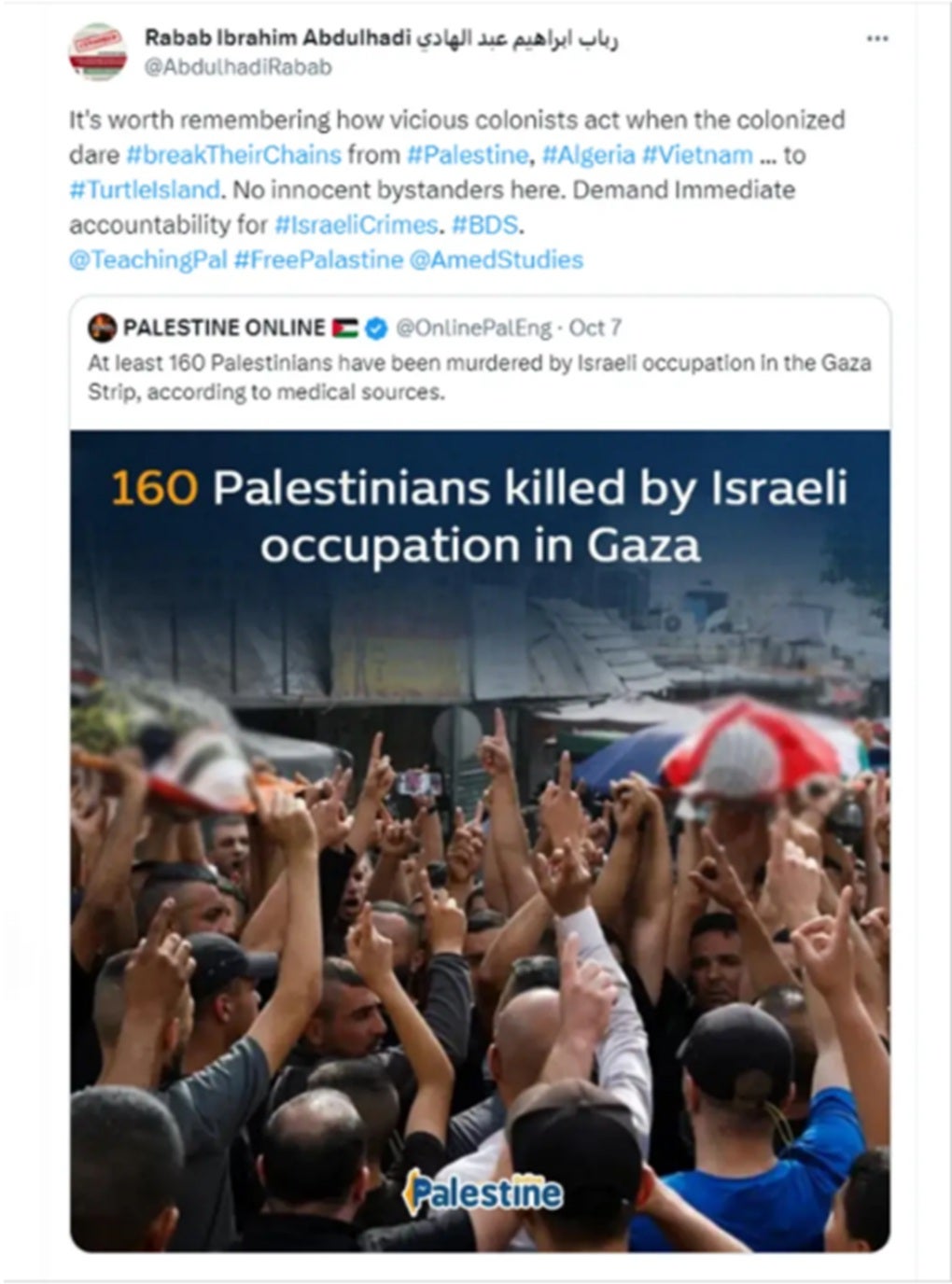
.
Gelman has also published several deeply inflammatory social media posts and statements. The day after the October 7 attack, Gelman published a celebratory post on Instagram that included images of Hamas fighters bulldozing through the Israel-Gaza border. She expressed that she was “[e]xcited for millions of Americans who have nodded along with land acknowledgements to get behind this, and resist cries that actual decolonization (but not Israeli ethnic cleansing) is somehow ‘too much.’” Responding to a reply that, “They murdered 250 kids at a music festival, Emmaia,” she remarked, in part, that “there are very few deaths that I’d celebrate, but many uprisings against terrible, impossible conditions [...] resulted in deaths, including unjust deaths.”

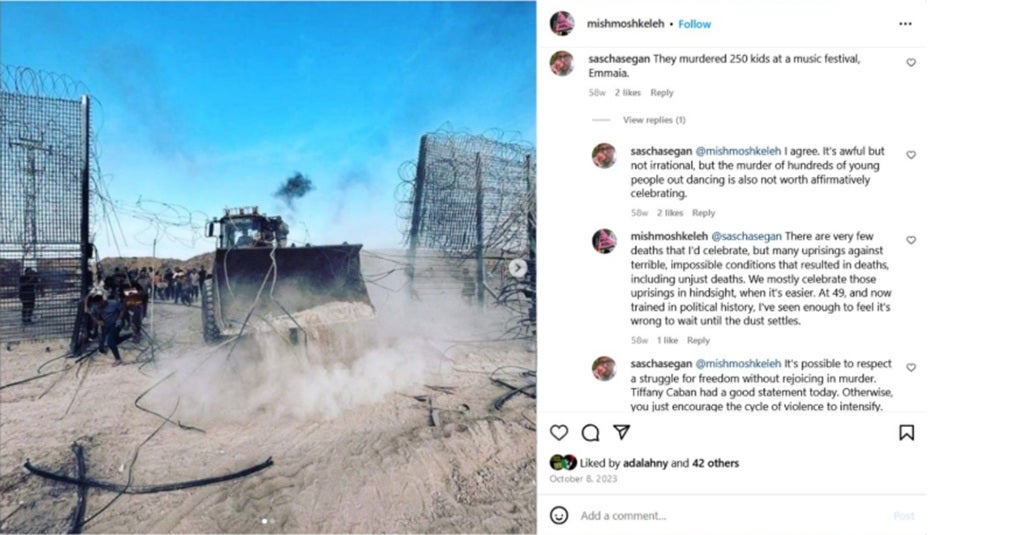
3. The ICSZ promotes conspiratorial claims about antisemitism and Zionism.
The ICSZ has collectively used its platforms, including its annual publication, the Journal for the Critical Study of Zionism (JCSZ), to legitimize false and even dangerously conspiratorial claims within the academic world about the nature of antisemitism and Zionism.
For instance, one article in the first issue of the journal in the fall of 2023 cites an essay that falsely asserted that Zionism sees Jews as a “chosen race” akin to “Nazi Aryanism.” It also makes the false claim that Zionism’s goal is to perpetuate antisemitism for the furtherance of its mission. To make this point, the article includes multiple conspiratorial accusations that Zionists intentionally conspired—in the service of furthering Zionism—to over-publicize their frustration surrounding the vandalism of a Cologne synagogue in 1959. According to the authors, it was this publicity in global media that directly led to a surge of hundreds of copycat incidents of antisemitic vandalism, which Zionists supposedly intended as an opportunity to bolster the Jewish diaspora’s identification with Zionism.
This article further contends that “Zionism is the primary beneficiary of antisemitism, “Zionism is... antisemitism,” and that “there is not really any systemic social, political, or economic oppression of Jewish people existent anywhere in the world.”
This article also introduces a deeply problematic idea, which the journal's “Keyword + Microsyllabus” section makes clear is in fact the central theme of the entire issue: the so-called “antisemitism industrial complex.” According to the article, the antisemitism industrial complex is “a network of powerful actors with financial and other material incentives to continue to (re)produce the problem they ostensibly exist to alleviate.”
The ICSZ’s editorial board notes that the inspiration for this concept came from Norman Finkelstein’s notion of a so-called “Holocaust industry,” or an exploitative mechanism in which Zionists weaponize and exploit memorialization and commemoration of the Holocaust to threaten and extort money and political favors.
In their own words, the board claims that the “Holocaust industry” is “an ongoing political effort by Zionist actors to exploit the historical suffering of Jewish people in Nazi Germany, as these actors demand that European countries pay reparations to Zionist causes, including to the Israeli government, in order to avoid accusations of antisemitism and, in turn, the threat of U.S. sanctions.”
4. The ICSZ’s "scholar-activists" blur the lines between academic study and anti-Zionist activism.
As the ICSZ is composed of both academics and activists with a strong anti-Zionist mission, its approach is to use academic credentials to confer maximal institutional legitimacy and an air of scholastic rigor onto anti-Zionist activism. A key rhetorical tactic across the activities of the ICSZ is to blur the line between scholarship and activism.
Members have referred to themselves as “scholars and activists,” and a podcast episode host described members and a guest speaker as “scholar-activists.”
Since its inaugural conference in October 2023, the institute’s activities have expanded to include additional events, workgroups, research workshops, a digital library of resources for research, podcasts, the creation of shareable social media materials, fellowships and syllabi for academic courses in Critical Zionism Studies.
The institute’s leaders are aware of the need to maintain a façade of institutional legitimacy and note that to be viewed merely as activists would be negatively construed. Its published materials frequently extend the label of “research” and “scholarship” onto purely activist materials and actions.
The Journal for the Critical Study of Zionism serves as one important vehicle for this. In the inaugural issue, the editorial collective described its vision to provide “a much-needed publication venue for scholars who struggle against censorship and distorted knowledge on this crucial topic.”
However, though it utilizes the veneer and language of an academic journal, it also seeks to provide activist materials and resources. For instance, one of the journal’s sections, Organizing Notes, is described as providing “tools and transcripts for anti-Zionist organizing” and contains an example letter for a local campaign against a county government adopting the IHRA definition of antisemitism. Additionally, calls for papers emphasize special interest in decidedly non-academic submissions. A call for papers for the journal’s second issue in 2024 invites the submission of proposals and abstracts aimed at “challenging and resisting Zionism.”
As another example, one major stated function of the ICSZ is the curation of what it calls “a growing library of research and analytical writing.” While this virtual library on the organization’s website includes some think pieces and research articles, these are co-mingled with activist materials such as toolkits and brochures the institute has produced for campaigns against the adoption of the IHRA definition of antisemitism, statements of solidarity from organizations such as Jewish Voice for Peace (JVP), large numbers of opinion pieces by institute members, and various “zines” with titles such as “Tell Citibank: Stop Financing Genocide” and “How to Liberate a Dining Hall.”
A particularly disturbing zine available in their digital library celebrates the Hamas-led October 7 massacre of Israelis, titled Operation Al-Aqsa Flood (Hamas’s official name for the attack), calling it “an act of decolonization.”
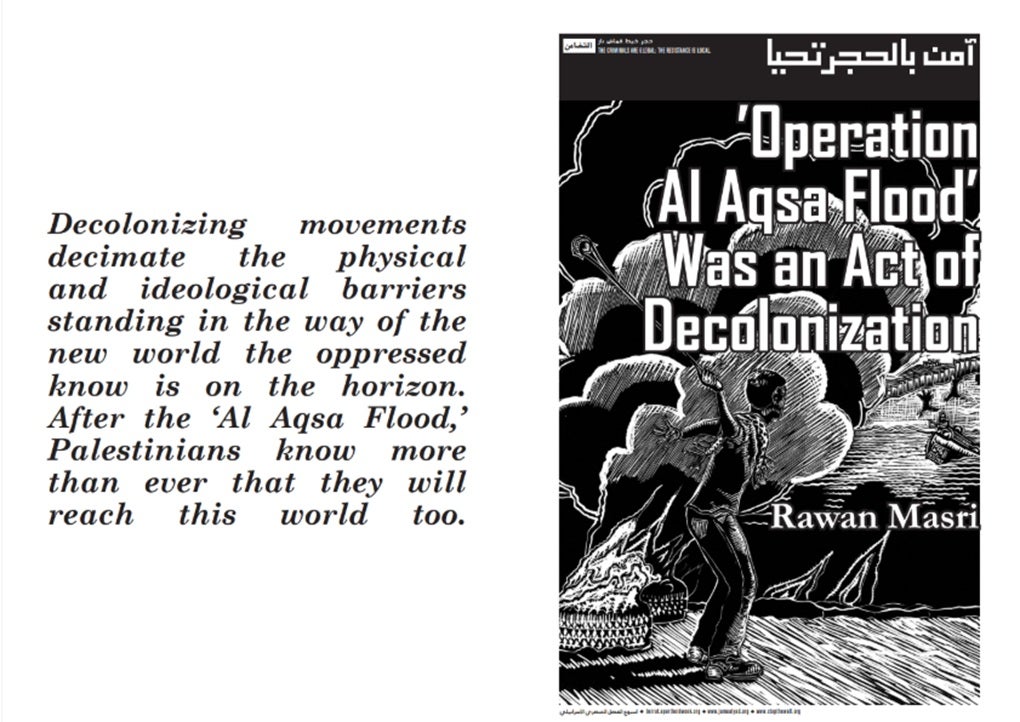
A zine from the ICSZ's digital library celebrating the Hamas-led October 7 massacre is titled Operation Al-Aqsa Flood (Hamas’s official name for the attack) and described as “an act of decolonization.” (Screenshot)
The institute is also trying to gain academic legitimacy by partnering with established university centers and programs. In addition to anti-Zionist activist groups such as JVP and the U.S. Campaign for the Academic and Cultural Boycott of Israel (USACBI), its first conference was co-sponsored by a number of academic programs and centers, notably the University of California, Santa Cruz’s Critical Race & Ethnic Studies Department and its Center for Racial Justice, the San Francisco State University (SFSU) Arab and Muslim Ethnicities and Diaspora Studies Program (AMED), and the UC Ethnic Studies Faculty Council.
Several of these programs and centers are headed or staffed by ICSZ founders or board members and are not wholly independent partners.
The SFSU AMED Program, for instance, is led by Prof. Abdulhadi—also a member of the National Students for Justice in Palestine (NSJP) Advisory Board—and the UC Santa Cruz Critical Race and Ethnic Studies Department is home to four ICSZ leaders.
In partnering their departments with the ICSZ, members use their positions within academia to reinforce and bestow additional academic credibility upon their activism.
However, the ICSZ intentionally disregards certain norms and conventions of scientific inquiry, such as disallowing or discounting the investigation of Zionist perspectives and narratives, on principle. “We reject the claim that those who critically study Zionism must debate its merits: our opposition to Zionism, colonialism, and white supremacy is a first principle,” says its FAQ page.
The institute takes anti-Zionist narratives as its starting point and does not allow for any debate over statements such as “Israel is a settler-colonial state.” Guest speakers on its podcasts have also disregarded or minimized what should be key facets in the rigorous study of Zionism, such as the diversity of Zionist thought or even the fact that there are different types of Zionism.
It also dubiously and uncritically links Zionism to entirely unrelated or even opposing ideologies. Some of its rhetorical tactics are reminiscent of a long history of Soviet anti-Zionist propaganda, notably the insistence on uncritically linking Zionism with Nazism and imperialism.
5. The ICSZ rejects the IHRA definition of antisemitism and framed its inaugural conference around “battling” this definition.
The ICSZ takes particular issue with the International Holocaust Remembrance Alliance’s (IHRA) definition of antisemitism, which—while controversial in some left-leaning circles—is widely accepted. The 2016 IHRA definition, crafted by the 31-nation International Holocaust Remembrance Alliance (including the United States), has since been adopted or endorsed by over 1,000 additional entities, including governments, NGOs and universities. IHRA is the most endorsed definition of antisemitism by governmental bodies worldwide.
The institute believes that the IHRA definition is a repressive tool “used to smear, defund, and in some cases criminalize those who oppose racism, colonialism, and genocide, and those who speak up for Palestinian voices and rights,” and that “Zionist and other right-wing forces” working for wider adoption of the IHRA definition are using “spurious antisemitism charges” as an excuse to crack down on critics.
The ICSZ’s inaugural conference, held within days of the Hamas-led October 7 terrorist attacks on Israel, centered around combatting the IHRA definition and promoting a toolkit that advocates for its rejection. The conference, titled “Battling the ‘IHRA definition [of Antisemitism]’: Theory & Activism Conference,” took place on October 13-14, 2023, simultaneously at UC Santa Cruz's Center for Racial Justice and NYU.
The event served as the launchpad for the ICSZ, months after its creation was first announced in August 2023 in the anti-Zionist publication Mondoweiss.
The institute initially solicited donations to cover the costs of the conference via the Venmo account of the WESPAC Foundation, a non-profit group that supports and administers funds for anti-Zionist and anti-Israel groups and those aligned with the Boycott, Divestment, and Sanctions (BDS) movement.
Notably, the US Campaign for the Academic and Cultural Boycott of Israel (USACBI) -- part of the BDS movement in which the ICSZ participates -- co-sponsored the conference, as did other anti-Zionist groups including the National Students for Justice in Palestine (NSJP) and JVP.
Three USACBI members sit on the ICSZ’s advisory board. Two longtime JVP leaders are also on the board and a JVP managing director is listed as a past member.